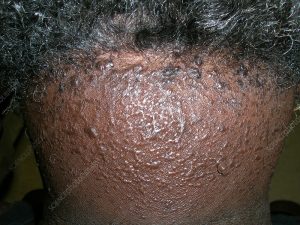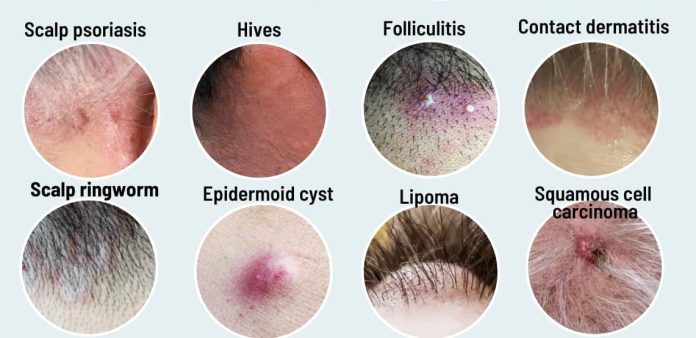For many of us, a healthy scalp is as crucial as a flawless skin. It’s the base of our beautiful hairstyles, from elegant braids to chic natural looks.
However, the appearance of scalp pimples can be a real concern. These pesky irritants, hiding under our lovely hairdos, not only cause discomfort but can also impact the health of our hair.
Whether you’re prepping for a special event or just styling your hair for a regular day, managing these unwelcome guests is essential.
In our world, where a healthy head of hair is a source of pride, scalp pimples can be particularly bothersome. Why do these nuisances appear, and how can we effectively treat and prevent them?
If you’re prone to scalp pimples, avoid heavy oils and pomades that can clog pores
This guide is here to explore the causes of scalp pimples, offer solutions for treatment, and provide tips to keep them from returning. Let’s embark on a journey to understand and maintain a healthy, pimple-free scalp, ensuring our hair remains as beautiful and healthy as ever.

Why pimples pop up on your scalp
• Clogged pores and more: Your scalp has pores just like your face, and they can get clogged with oil, dead skin, and hair products. This blockage can create the perfect environment for pimples. Regular hair treatments, conditioners, and even some styling products can leave residue that contributes to clogging.
• Sweating it out: For the active ladies or if you’re in a place with hot weather, sweat can mix with the natural oils on your scalp, making things worse. Sweat can also trap dirt and bacteria, which may lead to scalp acne. Wearing headgear like caps or scarves for long periods can also trap sweat and contribute to this issue.

Treating scalp pimples the right way
• Gentle cleansing: It’s important to wash your scalp with a mild, pH-balanced shampoo. Harsh shampoos or frequent washing can irritate your scalp more, causing oil glands to produce even more oil, which can worsen pimples. Look for shampoos designed for sensitive scalp or anti-dandruff shampoos with salicylic acid, as they can help prevent clogging.
• Natural remedies: Natural ingredients like tea tree oil have antimicrobial properties that can help in treating scalp pimples. Aloe vera, with its soothing properties, can calm an irritated scalp. Mix a few drops of tea tree oil into your shampoo or apply aloe vera gel to the affected areas after washing your hair.
Prevention
Keep it clean and balanced: Finding the right washing frequency is crucial. Washing your hair too much can strip away natural oils, while not washing enough can lead to buildup. Depending on your hair type and lifestyle, you might need to adjust how often you wash your hair.
If your scalp pimples are persistent and not responding to care, consult a dermatologist
• Choose the right products: If you’re prone to scalp pimples, avoid heavy oils and pomades that can clog pores. Opt for lightweight, non-comedogenic products. Also, be mindful of products with a lot of chemicals, as these can irritate your scalp and worsen pimples.
When to see a professional
• Stubborn pimples: If your scalp pimples are persistent and not responding to your usual care, it’s time to consult a dermatologist. They can provide specific treatments like medicated shampoos or topical solutions that are more effective for severe cases.
• It’s not just pimples: Occasionally, what seems like pimples could be symptoms of a more serious condition, such as scalp folliculitis, dermatitis, or even infections. If you notice symptoms like severe itching, pain, or unusual scalp reactions, seek professional advice to get the right treatment.
By understanding the causes and adopting proper care techniques, you can effectively manage and prevent scalp pimples, maintaining a healthy and comfortable scalp. Remember, a little care goes a long way in keeping those annoying pimples at bay!


